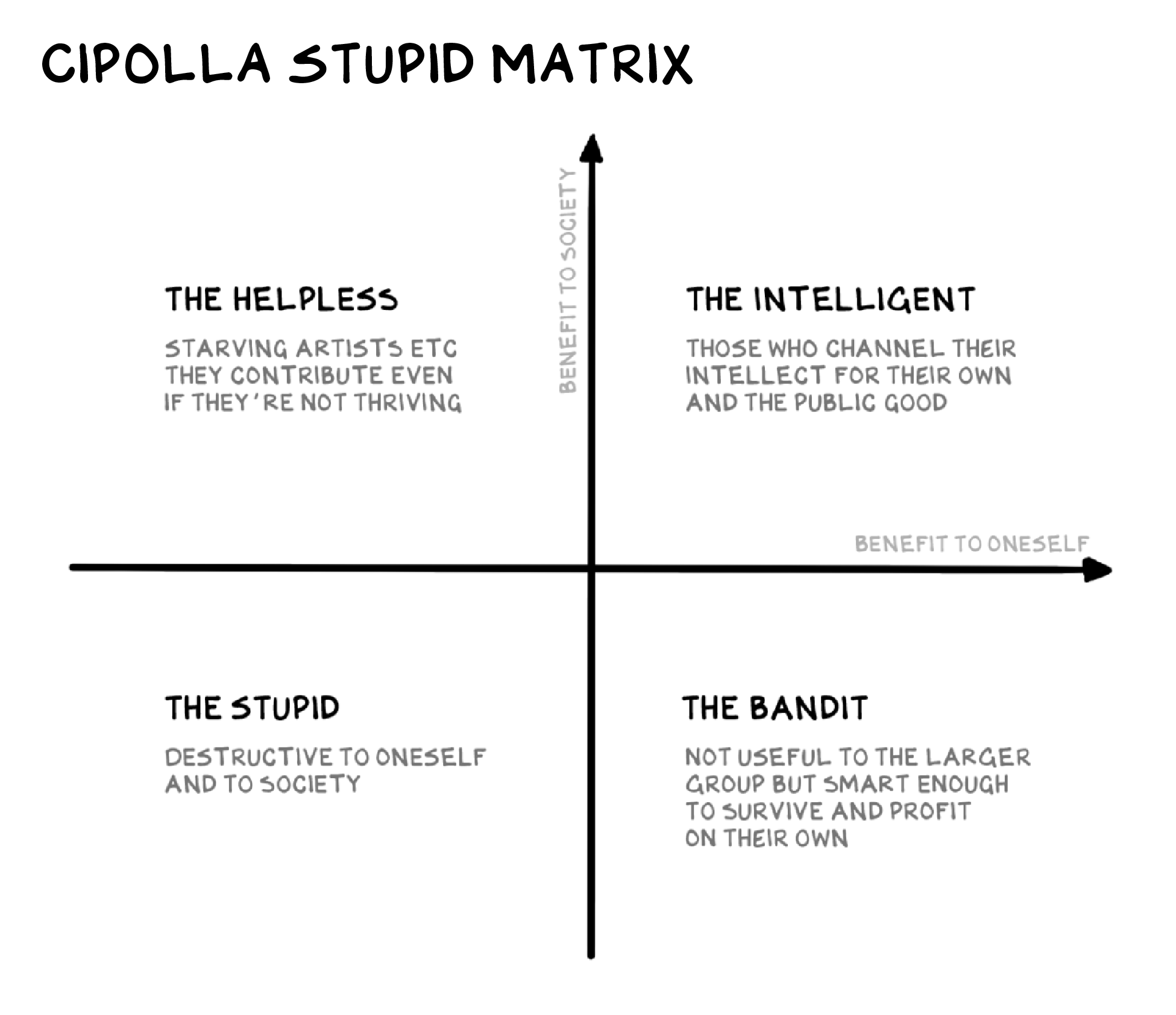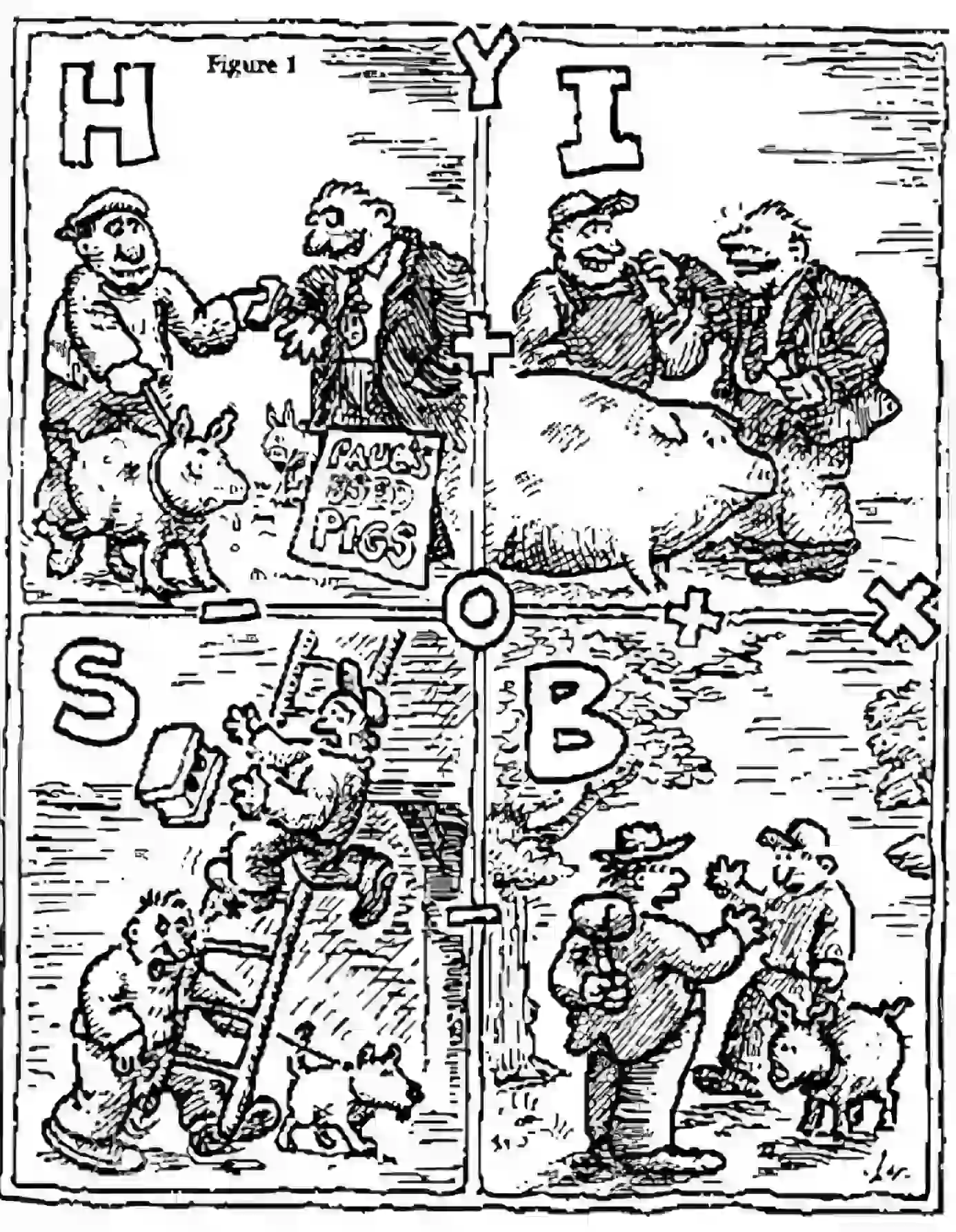Laws of Stupidity
Carlo M. Cipolla an Italian economic historian was a member of both the American Academy of Arts and Sciences and the American Philosophical Society. He produced a popular essay in 1976 about Rules of Stupidity in an Italian magazine. I think his observations are quite relevant so I wanted to simplify his essay so even the stupid can understand.
The First Basic Law of Human Stupidity
Stupid people appear suddenly and unexpectedly in the most inconvenient places and at the most improbable moments.
The First Law of Stupidity prevents us from attributing a specific numerical value to the fraction of stupid people within the total population: any numerical estimate would turn out to be an underestimate. Thus in this article we will denote the fraction of stupid people within a population by the symbol σ.
The Second Basic Law of Human Stupidity
General Idea is human beings are the output of a perfectly engineered creation. Geneticists and sociologists especially go out of their way to prove, with an impressive apparatus of scientific data and formulations that all men are naturally equal and if some are more equal than others. This is simply not true. Not all men are equal and that the difference is determined by nature and not by cultural forces or factors. One is stupid in the same way one belongs to the stupid set as one belongs to a blood group, uniformly distributed in the society according to a constant proportion.
Education has nothing to do with the probability was provided by experiments carried on in a large number of universities all over the world.
When we analyze the blue-collar workers we see that the fraction σ of them were stupid. As σ's value was higher than we expected (First Law),
First thing that comes to mind is segregation, poverty, lack of education were to be blamed. But moving up the social ladder we see that the same ratio was prevalent among the white-collar employees and among the students. More impressive still were the results among the professors. Whether I considered a large university or a small college, a famous institution or an obscure one, we see the same fraction σ of the professors are stupid.
This idea is hard to accept but the Second Basic Law is an iron law, and it does not admit exceptions.
The Third (Golden) Basic Law
The Third Basic Law assumes, although it does not state it explicitly, that human beings fall into four basic categories: the helpless, the intelligent, the bandit and the stupid. These four categories correspond to the four categories Intelligent, Helpless, Stupid, Bandit, of the basic graph (see below).

When confronted for the first time with the Third Basic Law, rational people instinctively react with feelings of skepticism and incredulity. Reasonable people have difficulty in conceiving and understanding unreasonable behaviour.

When confronted, first instinct of rational people is to confuse the stupid people with bandits. The perfect bandit is one who, with his actions, causes to other individuals losses equal to his gains. The crudest type of banditry is theft. A person who robs you of 100 pounds without causing you an extra loss or harm is a perfect bandit: you lose 100 pounds, he gains 100 pounds.
Nobody knows, understands or can possibly explain why that preposterous creature does what he does. In fact there is no explanation - or better there is only one explanation: the person in question is stupid.
The Power of Stupidity
It is not difficult to understand how social, political and institutional power enhances the damaging potential of a stupid person.
Essentially stupid people are dangerous and damaging because reasonable people find it difficult to imagine and understand unreasonable behaviour. An intelligent person may understand the logic of a bandit. The bandit's actions follow a pattern of rationality: nasty rationality, if you like, but still rationality. The bandit wants a plus on his account. Since he is not intelligent enough to devise ways of obtaining the plus as well as providing you with a plus, he will produce his plus by causing a minus to appear on your account.
With a stupid person all this is absolutely impossible as explained by the Third Basic Law. A stupid creature will harass you for no reason, for no advantage, without any plan or scheme and at the most improbable times and places. You have no rational way of telling if and when and how and why the stupid creature attacks. When confronted with a stupid individual you are completely at his mercy. Because the stupid person's actions do not conform to the rules of rationality.
a) one is generally caught by surprise by the attack;
b) even when one becomes aware of the attack, one cannot organize a rational defense, because the attack itself lacks any rational structure.
The fact that the activity and movements of a stupid creature are absolutely erratic and irrational not only makes defense problematic but it also makes any counter-attack extremely difficult - like trying to shoot at an object which is capable of the most improbable and unimaginable movements.
The Fourth Basic Law
| The erratic behaviour of the stupid, one cannot foresee all the stupid's actions and reactions and before long one will be pulverized by the unpredictable moves of the stupid partner. Non-stupid people always underestimate the damaging power of stupid individuals. In particular non-stupid people constantly forget that at all times and places and under any circumstances to deal and/or associate with stupid people always turns out to be a costly mistake. |
The Fifth Basic Law
The Fifth Basic Law states that:
After the action of a perfect bandit, the bandit has a plus on his account which plus is exactly equivalent to the minus he has caused to another person.
When stupid people are at work, the story is totally different. Stupid people cause losses to other people with no counterpart of gains on their own account.
This article is my simplified version of Carlo M. Cipolla's article "The Basic Laws of Human Stupidity" (1976)
Admin General